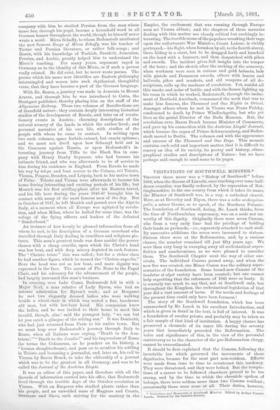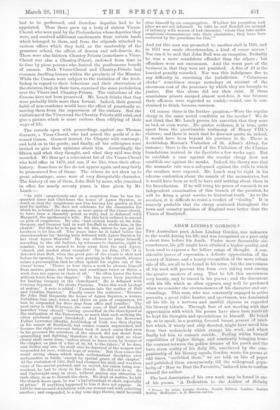VISITATIONS OF SOUTHWELL MINSTER.* THOUGH there never was a "
Bishop of Southwell" before 1884, when the diocese of Lincoln, once reaching over some half- dozen counties, was finally reduced, by the separation of Not- tinghamshire, to the one county from which it takes its name, the Minster of Southwell was, in a way, a cathedral church. Here, as at Beverley and Ripon, there was a seder; arehiepisco- palis, a minor throne, so to speak, of the Northern Primate.. The foundation of Southwell, dating, Mr. Leach thinks, from the time of Northumbrian supremacy, was on a scale not un- worthy of this dignity. Originally there were seven Canons, who from a very early time had the privilege of holding their lands as prebends,—i.e., separately attached to each stall. By successive additions the seven were increased to sixteen. Sixteen there were at the Reformation, and, by a curious chance, the number remained till just fifty years ago. We were then very busy in sweeping away all ecclesiastical super- fluities and anachronisms, as we were pleased to consider• them. The Southwell Chapter went the way of other sur- vivals. The individual Canons passed away, and when the new See was created, one Minor Canon was the solitary repre- sentative of the foundation. Some brand-new Canons of the• laudatur et alget variety have been created; but one cannot help regretting that the reformers of 1841 were so hasty. It is scarcely too much to say that, not at Southwell only, but throughout the Kingdom, the ecclesiastical legislation of that year did a vast amount of harm. If the needs and feelings of the present time could only have been foreseen !
The story of the Southwell foundation, which has been summarised by Mr. Leach in his excellent Introduction, and which is given in detail in the text, is full of interest. It was. a foundation of secular priests, and probably may be taken as a fair sample of that kind of institution. A happy chance has preserved a chronicle of its inner life during the seventy years that immediately preceded the Reformation. The value and significance of this, in the view of the perennial controversy as to the character of the pre-Reformation clergy, cannot be overestimated.
It should be first explained that the Canons, following the invariable law which governed the movements of these dignitaries, became for the most part non-resident. Efforts. were made from time to time to counteract this tendency. They were threatened, and they' were bribed. But the tempta- tions of a career to be followed elsewhere proved to be too. strong, and by the time to which the chronicle spoken of belongs, there were seldom more than two Canons resident;, occasionally there were none at all. Their duties, however, • Visitationg and noraorials of Southwell 3fineer. Edited by Arthur Francip. Iowa. Printed for the Camden Society.
had to be performed, and therefore deputies had to be appointed. Thus there grew up a body of sixteen Vicars- Choral, who were paid by the Prebendaries whose deputies they were, and received additional emoluments from certain lands which belonged to them, and from the stipends attached to various offices which they held, as the mastership of the, grammar school, the offices of deacon and sub-deacon, Sze.
There were also thirteen Chantry-Priests (sometimes a Vicar- Choral was also a Chantry-Priest), endowed from time to to time by pious persons who desired the posthumous benefit of masses. Both Vicars-Choral and Chantry-Priests had common dwelling-houses within the precincts of the Minster. While the Canons were subject to the visitation of the Arch- bishop in regard to their behaviour and their observation of the statutes, they, in their turn, exercised the same jurisdiction over the Vicars and Chantry-Priests. The visitations of the Canons have not been preserved. Mr. Leach thinks that they were probably little more than formal. Indeed, their general habit of non-residence would have the effect of practically re- moving them from the supervision of the visitors. But the visitations of the Vicars and the Chantry.Priests still exist, and give a picture which is more curious than edifying of their
ways of life.
The records open with proceedings against one Thomas Garnett, a Vicar-Choral, who had seized the goods of a de- ceased Canon. Garnett treated the Chapter with contempt ; and held on to the goods ; and finally, all his colleagues were invited to give their opinions about him. Accordingly, the fifteen said what they thought, and what they said was duly recorded. We thus get a convenient list of the Vicars-Choral who held office in 1470, and can, if we like, trace their after- history. Some four or five do not appear again, and may fairly be pronounced free of blame. The others do not show up to great advantage ; some were of very disreputable character.
The history of one of them, John Bull by name, who remained in office for nearly seventy years, is thus given by Mr. Leach:—
" In 1475 suspiciously and at a suspicious time he has fre- quented since last Christmas the house of Agnes Saynton, so much so that the neighbours saw him leaving her garden at first peal for matins.' He does not celebrate for the chauntries for which ho is bound (he appears, as wore many of the vicars choral, to have been a chauntry priest as well), and is defamed with Margaret, the apothecary's wife. For this he is ordered to amend on pain of suspension. He also laid violent hands on Sir John Gregory, and Gregory laid in wait for.Bull to strike him, in the church.' For this he is to pay Os. 8d. fine, unless ho can get his brethren to lot him off. Two years later he is haled before the churchwardens for having been defamed with Agnes Saynton by her rival Agnes .Harcold.' He was allowed to purge himself, according to the old fashion, by witnesses to character, eight in number, but was warned to keep away from the said Agnes, `church and market alone excepted.' On 1st July, 1748, it is detected that Bull, when the great gate of the vicars is shut and before its opening, has been seen praying in the church, whence arises a presumption that he often spends his nights out of the vicars' house." Thrice or four times a week ho absents himself from matins, prime, and hours, and sometimes twice or thrice a week does not appear in choir at all.' He often leaves the town without leave from the chapter.' He has never been punished for beating Gregory in the churchyard.' He is defamed with Cristina Saynton. ' He shirks Preciosa. Twice this week he slept at matins.' A note is added Examine into the matter of Bull and Cristina Saynton.' Finally comes the sentence : 'Because Sir John Bull frequents the house of Agnes Saynton, a woman forbidden-him once, twice, and thrice on pain of suspension, lot him be suspended for three days from office and benefice.' The next entry is 12th February, the same year, of Bull and Kendall (another vicar choral) ' having quarrelled in the churchyard at -the instigation of the Tare-sower, so much that each striking the -other produced great bloodshed ; And because the Reverend Father Lawrence (Booth), Archbishop of York, was then staying in his manor at Southwell, lest crimes remain unpunished, and because the right reverend father took it much amiss that even in his presence the ministers of the church did not desist from quarrelling and fighting,' therefore it is decreed that no vicar choral shall carry arms, `unless about to leave town by license of the chapter, on pain of a fine of Os. 8d. to the fabric ;' if he does, and strikes any one, he shall also be deprived of the weapon and suspended for ever, without hope of return.' But then comes the ,usual saving clause which made ecclesiastical discipline over ecclesiastics so futile, 'except by special grace of the chapter.' At the visitation of 1481, Bull had changed his stall, and was then vicar of the sacrist prebend, and as sacrist, his canon being non- resident, he had to sleep in the church, He did not do so. Be and Cartwright sang in choir, without paying any attention to each other, so as to disturb the choir. Be slept at matins, he left the church doors open, he was 4a bad attendant at choir, especially at prime.' if anything happened to him it does not appear. in 1483 ho was accused of adultery with one woman and with soliciting another ; and suspended, to a clay nine days thence, until he could clear himself by six compurgators. Whether his purgation took place we are not informed. In 1484 he and Kendall are accused of intimacy with women of bad character, whom they take under suspicious circumstances into their chauntries; they have been corrected by the guardians for this.'" And yet this man was promoted to another stall in 1505, and in 1511 was made churchwarden, a kind of censor merlon Nor can it be said that John Bull was an exception. Probably he was a more scandalous offender than the others ; but
offenders were not uncommon. And the worst part of the business is, that they were not punished. A fine of £1 is the heaviest penalty recorded. Nor was this indulgence due to any difficulty in exercising the jurisdiction. " Criminous clerks " sometimes escape nowadays on account of the enormous cost of the processes by which they are brought to justice. But this abuse did not then exist. If these scandalous priests escaped almost scot-free, it was because their offences were regarded as venial,—venial, one is con- strained to think, because common.
Of course there is the further question,—Were the regular clergy in the same moral condition as the secular P We do not think that Mr. Leach proves his assertion that they were as bad, or even worse. He quotes evidence, it is true, quite apart from the questionable testimony of Henry VIII.'s visitors ; and there is much that ho does not quote, as, indeed, it would have been beyond his province to do. There is
Archbishop Morton's Visitation of St. Alban's Abbey, for instance ; there is the record of the Visitation of the Clutha° foundations (noticed in the Spectator a few weeks ago). But to establish a case against the secular clergy does not establish one against the monks. Indeed, the theory was that the monastic rule was a safeguard against the evils to which the seculars were exposed. Mr. Leach may be right in his adverse contention about the morals of the monasteries, but it would have been as well to have said nothing about them in his Introduction. If he will bring his power of research to an independent examination of this branch of the question, he will be doing a great service to historical truth. As to the seculars, it is difficult to resist a verdict of " Guilty." It is scarcely probable that the clergy scattered throughout the
town and country parishes of England were better than the Vicars of Southwell.



































 Previous page
Previous page